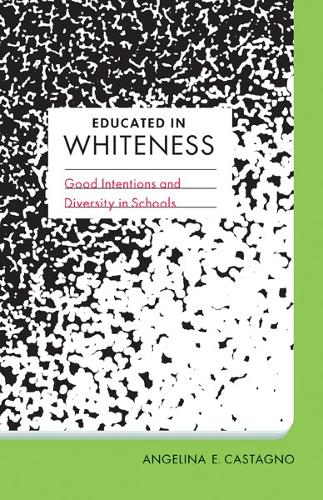
Educated in Whiteness: Good Intentions and Diversity in Schools
(Paperback)
Publishing Details
Educated in Whiteness: Good Intentions and Diversity in Schools
By (Author) Angelina E. Castagno
University of Minnesota Press
University of Minnesota Press
1st July 2014
United States
Classifications
General
Non Fiction
Philosophy and theory of education
Education / Educational sciences / Pedagogy
Ethnic groups and multicultural studies
940.53
Physical Properties
Paperback
240
Width 140mm, Height 216mm, Spine 25mm
Description
Educators across the nation are engaged in well-meaning efforts to address diversity in schools given the current context of NCLB, Race to the Top, and the associated pressures of standardization and accountability. Through rich ethnographic accounts of teachers in two demographically different secondary schools in the same urban district, Angelina E. Castagno investigates how whiteness operates in ways that thwart (and sometimes co-opt) even the best intentions and common sense--thus resulting in educational policies and practices that reinforce the status quo and protect whiteness rather than working toward greater equity.Whereas most discussions of the education of diverse students focus on the students and families themselves,
"Educated in Whiteness" highlights the structural and ideological mechanisms of whiteness. In schools, whiteness remains dominant by strengthening and justifying the status quo while simultaneously preserving a veneer of neutrality, equality, and compassion. Framed by critical race theory and whiteness studies, this book employs concepts like interest convergence, a critique of liberalism, and the possessive investment in whiteness to better understand diversity-related educational policy and practice.Although in theory most diversity-related educational policies and practices are intended to bring about greater equity, too often in practice they actually maintain, legitimate, and so perpetuate whiteness.
Castagno not only sheds light on this disconnect between the promises and practices of diversity-related initiatives but also provides insight into "why" the disconnect persists.
Reviews
"Angelina E. Castagno's up-close look at how whiteness operates in actual schools, and within one school district, offers a rare, ethnographic portrait of how policies ostensibly aimed at effecting educational equity actually end up reinforcing the status quo. We still have much to learn about how whiteness and racism function in everyday life, and Educated in Whiteness is unusual in the field, offering an important way of seeing how whiteness operates across the system."Thea Abu El-Haj, Rutgers University
Author Bio
Angelina E. Castagno is associate professor of educational leadership in the College of Education at Northern Arizona University.
